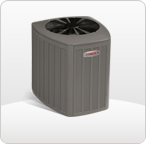
One of the most important components of your home’s air conditioning system is the compressor. The compressor squeezes or compresses air conditioning fluid into a dense, high-temperature liquid, which is then passed into the evaporator through a tiny intake hole. On the other side of this hole, the fluid’s pressure drops and it begins to evaporate into a gas, a process which extracts heat from the surrounding environment and cools the air in your house.
If your air conditioner system’s compressor isn’t functioning correctly, your system won’t be able to cool the air, and could heat up to the point where it could be damaged or even catch fire. Following a few simple procedures that you can do yourself will help you pinpoint the problem in your compressor and then get it running properly again.
The first thing of course is to make sure the compressor is actually the problem. You’ll want to spot check all the parts of your system to make sure some other component isn’t the one reducing effectiveness. Ensure that the compressor is powering on successfully, then move on to checking that your thermostat is functioning properly. Check your ductwork for any obvious holes or blocked vents. Try to rule out other potential sources of problems, then if your compressor doesn’t appear physically damaged, you can try taking some steps to get it running again.
To ensure that you’re getting optimal performance out of your compressor, proper airflow is essential. Power off your unit and remove any dirt or debris that has built up on the outside of it. Take the opportunity to trim back any plants or grass nearby, and clear away any leaves that have accumulated. Remove the protective grill and clean the fins off – using a vacuum with a brush attachment is great for this and will help make sure that you’re really getting an effective clean.
If your unit won’t power on at all, check your fuse box to see if any fuses have blown or breakers have been tripped. Compressors should be placed on their own 240-volt circuits to avoid problems with power supply. If you suspect an electrical issue with your system, call R.S. Andrews and our techs will inspect your system thoroughly for electrical resistance and continuity.
If your compressor is clean, airflow is good and electrical problems have been ruled out, you might just be low on coolant. If you haven’t had your AC system serviced in a while, you may just need to have your coolant refilled, so call R.S. Andrews to schedule a checkup. Our expert HVAC techs can quickly determine if you need more coolant, or if there is a coolant leak somewhere in your system that needs to be addressed first.
The above advice can help you pin down the problem if your AC isn’t functioning as it should, but if you’re still having problems with your system, your best option is to call R.S. Andrews. If you’re not familiar with the inner workings of your compressor unit or other parts of your air conditioning system, you can cause more damage by trying to attack the problem yourself, so play it safe and get an R.S. Andrews expert on the case, and consider setting up a regular maintenance agreement to avoid problems in the future.
